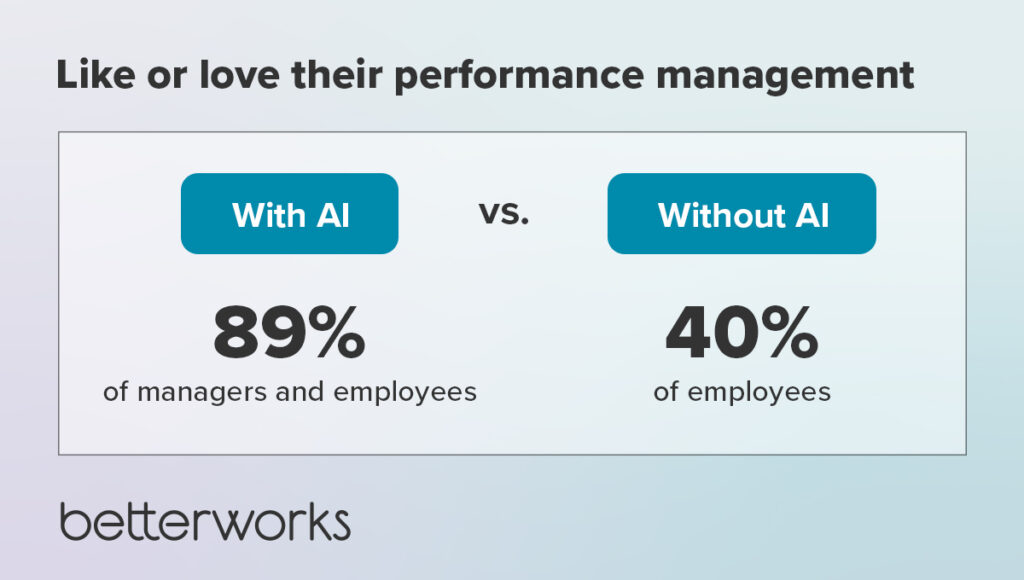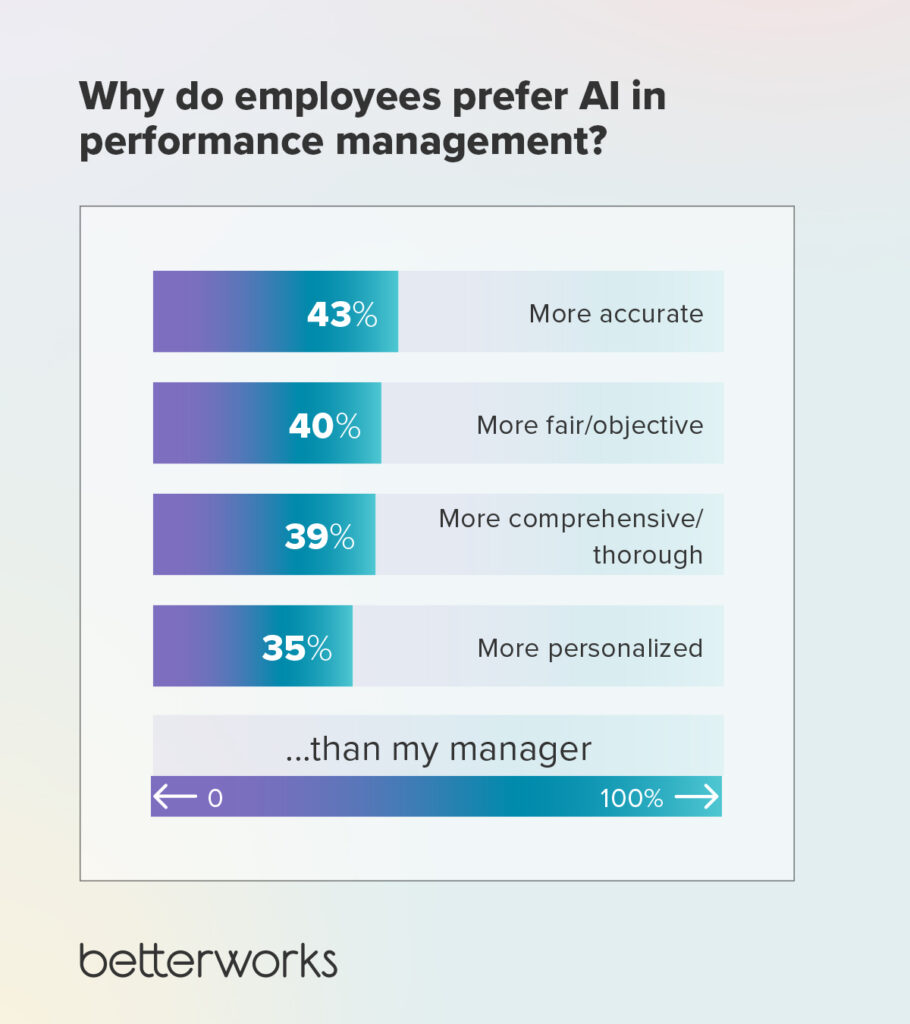Performance management — and in particular, performance reviews — have made people cry. They’ve led to feelings of anger. They’ve caused employees to quit. And, they’ve left managers dreading the calendar alert reminding them it’s “that time of year” again.
Some stories feel painfully familiar, even cringy. An article by Inc. shared excerpts of collected stories. One employee in a newly created position received a poor review after 30 days because their work didn’t meet undefined expectations, despite having had weekly one-on-ones with their supervisor, where no feedback was provided. In another case, employees spent hours filling out detailed self-reviews only to find out their manager had pre-filled the ratings before leaving on vacation. And yet another long-term employee with a history of strong reviews was given a dramatically different rating by a new manager who did not feel the need to look at past reviews.
What’s the point of performance reviews and performance management if the process is not accurate, fair, or comprehensive — if it’s designed in a way that doesn’t help people improve and grow?
Employees often wonder the same thing. Only 1 in 3 say their performance review process helps them perform better, and 37% of workers describe performance management as an outright failure in their company, according to Betterworks’ 2024 State of Performance Enablement report. Nearly two-thirds 64% of employees see performance reviews as sometimes or always a waste of time. Gallup’s research shows that bad performance reviews make performance worse one-third of the time.
AI is about to change all that — and for the better.
Employees — and managers — want AI-enabled performance management
Organizations are now waking up to the fact that traditional performance management isn’t working. The 2025 State of Performance Enablement report highlights a major shift in employees’ expectations toward more transparency, fairness, and a continuous approach to performance feedback. And they believe AI can deliver it. Nine of 10 managers and employees report high satisfaction with AI-enabled performance management, with only 10% saying they’re uncomfortable with it.

The link between good performance management and engagement, productivity, and retention is undeniable, as statistics derived from the 2023 State of Performance Enablement and 2024 State of Performance Enablement show:
- Employees who like their performance management are engaged at an 88% higher rate than employees who are not performance-enabled (i.e., 49% of employees who feel performance-enabled report being engaged versus 26% of those who do not feel performance-enabled).
- High productivity jumps 31% when performance management processes succeed
- Productivity is 29% higher when employees think performance reviews are “very fair,” than when they see their reviews as “somewhat biased.”
- Employees who say they have good performance conversations with their managers are 1.5X more likely to always like working for their company than employees who rarely or never do get good performance conversations
Employees no longer want to wait months to find out how they’re doing. They thrive when they receive timely, relevant feedback that helps them grow continuously. They want clarity on expectations, visibility into their progress, and assurance that their performance evaluations are fair. As we explain below, using AI in performance management produces greater objectivity, comprehensiveness, and accuracy.
Managers, too, can benefit from AI’s help. Nearly one-quarter have reduced 1:1 meetings with their direct reports and 17% are spending less time on qualitative feedback as coping mechanisms. To cope with their workloads, more than one-third are using AI tools to increase their efficiency or effectiveness. Managers have also struggled with unconscious biases and inconsistent review processes. AI offers a way to streamline performance management, ensuring that every employee gets the support and recognition they deserve.
Benefits of AI-assisted performance management
AI in performance management isn’t just about efficiency — it’s about fairness, clarity, and growth. Here’s why employees are embracing it.
AI reduces bias and ensures objectivity
One of the biggest frustrations with traditional performance management is subjectivity. Managers, often unintentionally, rely on memory and perception rather than objective data. This leads to recency bias, where only the most recent work is considered, and unconscious bias, where personal preferences influence evaluations.
AI changes that. Instead of relying on human memory, AI collects, analyzes, and presents performance data in real time. This ensures a holistic, unbiased view of an employee’s contributions over time.
AI speeds and simplifies frequent, actionable feedback
Employees benefit most when they can receive ongoing feedback, coaching, and recognition that helps them improve in the moment.
AI-powered performance management provides real-time insights, nudging employees toward their goals and flagging potential roadblocks before they become major issues. Managers can use structured, AI-assisted conversations to guide discussions, ensuring that feedback is specific, relevant, and useful.

AI surfaces career growth pathways
A lack of clarity around career progression is a major reason employees become disengaged. They want to know how they can grow in their role, what skills they should develop, and the opportunities that exist for internal career advancement.
AI can help by analyzing an employee’s performance, skills, and project contributions to recommend learning opportunities, promotions, or new roles. A LinkedIn Workforce Learning Report found that employees who see a clear career growth path are 41% less likely to leave their jobs.
By leveraging AI-powered insights, HR leaders and managers can proactively help employees map out their career progression, ensuring they feel valued and motivated.
How Betterworks AI tools transform performance management
Betterworks integrates AI-powered tools for goal-setting and tracking, conversations, and feedback into a seamless, employee-centric performance management experience. These tools don’t just make processes more efficient — they fundamentally change the way employees and managers engage with performance management.
AI-assisted goals keep employees aligned and accountable
Betterworks Goal Assist draws on an employee’s performance data from Betterworks modules to suggest and aid with drafting clear goals that are aligned with an employee’s team and company goals, saving time and effort, and promoting achievement.
Smart conversations foster trust, growth, and development
Performance management is about growth, not solely evaluation. Betterworks’ AI-powered Conversations tool improves the quality and clarity of manager-employee performance and career development communications. By drawing on employee goals, feedback, recognition, and other data, the tool helps managers clearly and confidently coach, express their expectations, and provide actionable takeaways for employees.
Conversation templates and prompts for managers facilitate discussions that focus on coaching, career development, and continuous improvement. By making these conversations a regular practice, employees receive timely feedback and actionable guidance, reducing the frustration of vague, retroactive evaluations. Employees feel heard, and managers gain deeper insights into their teams, strengthening workplace relationships and boosting engagement.
Unbiased feedback builds an open, performance-driven culture
AI-assisted feedback can supercharge a culture of feedback by enabling managers and colleagues to provide personalized, constructive, and unbiased feedback in real time. Doing so enables employees to understand their impact on their team or company and continuously improve while also strengthening trust among peers and between managers and their reports.
Betterworks’ AI-assisted Feedback Summary overcomes the challenge of condensing disparate feedback into comprehensive and actionable insights. It streamlines and simplifies the performance review process, yielding superior outcomes in a fraction of the time, in turn giving managers the time and tools to coach effectively. Employees receive a comprehensive, professional, and unbiased analysis of their performance and development opportunities, enabling them to improve and benefit from stronger relationships with their managers.
LivePerson has adopted these AI features in the Betterworks platform. The company has improved goal creation, feedback, and performance conversations, resulting in time savings on performance reviews of up to 75%, better manager-employee interactions, and higher-quality goals and feedback.
AI enhances performance management
Performance management doesn’t need to be a time-consuming, dreaded activity. Rather, it should be an ongoing, empowering experience that helps people grow, succeed, and feel valued. Organizations that embrace AI in performance management will not only see improvements in employee satisfaction but can also use AI-enabled performance management as a vehicle for helping employees adopt AI in their daily work.
Learn more about how promoting equitable use of AI across the company and in performance management can change your trajectory by reading the 2025 State of Performance Enablement report.
How is AI improving performance management?


